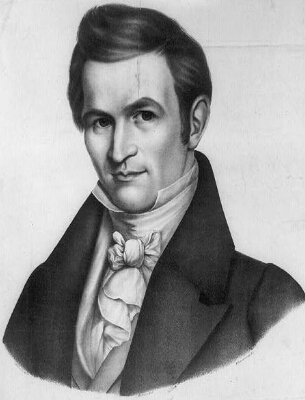
Jonathan Cilley (July 2, 1802 – February 24, 1838) was a member of the U.S. House of Representatives from Maine. He served part of one term in the 25th Congress. He died in office at Bladensburg, Md. as the result of being challenged to fight a duel with Congressman William J. Graves, a colleague from Kentucky. Graves, an experienced marksman, had issued the challenge after Cilley had criticized a newspaper article written by Graves's political ally, New York City editor James W. Webb.
Cilley died in office as a sacrifice to the bitter political climate that surrounded the Twenty-fifth Congress. With the Democratic Party, Cilley's party, strongly at odds with the opposition Whig Party, supporters of both sides mobilized the newspapers favoring each party. One of the pillars of the Whig Party was the New York Courier and Enquirer, an East Coast newspaper edited by James Watson Webb.
Democrats, including Cilley, considered Webb's coverage of Congress to be biased and unfair, and Cilley vented some of his party's bitterness in remarks made on the House floor. Webb, who considered himself insulted by Cilley's remarks, and unable to respond within the House chamber because he was not an elected member of the House, persuaded a Whig friend, the Kentucky marksman William J. Graves, to challenge Cilley to a duel. Duelling was prohibited within the boundaries of the District of Columbia by federal law, so the participants and their seconds arranged to meet at the Bladensburg dueling grounds, across the state line in Maryland. The meeting on the "field of honor" was scheduled to take place on February 24, 1838.
When the duel took place, Graves fatally wounded Cilley by shooting him through the femoral artery. The unfortunate congressman bled to death on the field. Jonathan was buried in Elm Grove Cemetery in Thomaston, Maine.
In 1838, after Cilley's death, longtime friend Nathaniel Hawthorne published two biographical sketches of the fallen congressman. The lawmaker's colleagues paid tribute to him in 1839 by passing a federal law strengthening the prohibition against dueling in Washington, D.C. Dueling itself was already forbidden within the District; the 1839 law created the new criminal offenses of issuing a challenge to a duel, or accepting a challenge, within the boundaries of the District, even if the duel itself was meant to take place outside the District.